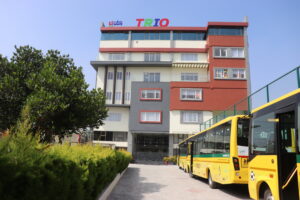Choosing among the “Best International Schools in Bangalore”
The question “Have you decided on a school for your daughter / son?” invokes anxiety in many a parent. We believe that gathering plenty of information about prospective international schools from the school head, admission officer, teachers, other parents and websites goes a long way in making an informed choice. However, knowing the right questions to ask is as important as knowing whom to talk to! We have prepared a detailed list of crucial questions about choosing among the Best International schools in Bangalore, based on our interactions with many parents over the years.
Here are the 30 must ask important frequently asked questions (FAQ) by parents from the school.
1.Which boards are the school affiliated to? Are those affiliations valid?
The international school in question might boast of many board affiliations. The best way to verify this claim is
by visiting the respective board’s website and checking if they list the school’s name.
Cambridge curriculum –www.cie.org.uk
International Baccalaureate –www.ibo.org
2.Does the school have a NOC from the Block Education Officer (BEO)?
A No Objection Certificate (NOC) from the Block Education Officer authorises the school to run its operations
in a particular block or zone. Running a school without NOC is legally prohibited.
3. Who is the head of the school?
The right leadership can make a huge difference to the school’s culture and its progress. Be sure to inquire about the current school head’s past experience, credibility, work ethics and vision.
4. What kind of background and experience do the teachers have?
Teachers have a very powerful influence on a student. Teachers must have adequate training in art and science of teaching. They must alsobe qualified their area of expertise. Experience in working with Best International Schools in outside India is a plus.
5. Do the teachers attend regular professional development (PD) courses or seminars?
Professional development programmes help teachers strengthen their skills across a variety of areas. They are generally conducted by experienced teachers, researchers, psychologists and other professionals. The topics may include new teaching methodologies, how to deal with different challenges in the classroom, difficulties faced by children, effectively communicating about these challenges with parents and best approaches to overcome them, etc.
6. How many faculty development programmes does the school conduct every year?
4-5 faculty development programmes in a year would be optimum.
7. Are the school staff always friendly and approachable?
Your children will be interacting with the school staff for a large portion of their day. It helps to know that they are approachable and helpful!
8. Does the school employ all female staff in pre-primary / primary section?
Check if the school values the care and safety of pre-primary and primary children by employing only female staff.
9.Do the staff goes undergo any verification process like Criminal Background Verification (CBV) prior to recruitment?
As a parent, a child’s safety and well-being is constantly on one’s mind, especially when they are at school. Ensuring that all the school staff have cleared CBV checks goes a long way in any untoward incidents in the future.
10.Does the school provide any insurance cover to children for accidents that occur within the campus?
The school’s duty is to prevent any accidents while on the campus. Even in case of any unfortunate accident, insurance cover is an added bonus.
11. What is the average class size?
A class size of 24 is ideal and 30 should be the maximum limit.
12. Are the classrooms airy, bright and spacious?
A healthy environment is essential for learning to happen in leaps and bounds. Make sure that you inspect the look and feel of the classrooms where your children will be spending a good portion of their time!
13. Are all the classrooms equipped with multimedia equipment (AV system, projector, computer etc.)?
AV / Projector / Computer / iPad are essential for application based learning.
14. What is the school’s approach to art and music? What kind of creative freedoms and boundaries are offered to the students?
The school’s programmes must expose children to art and music from many countries & cultures. Look for something beyond ordinary programmes that help kids discover their own strengths, interests and styles rather than teaching art & music as a mere classroom subject.
15. What kind of facilities does the school offer for sports?
Ideally, the school should have a playground for athletics & track events, and at least 3 to 4 different sports facilities
16.How much time is dedicated for extracurricular / co-curricular activities? What are the types of activities offered?
Ideally there should be at least one period of extracurricular or co curricular activity 5 days a week. All schools offers various kind of activities. Check out how interesting and relevant those activities for the children.
17. How many PTMs are conducted in a year?
Three (3) PTMs a year would be the optimum goal.
18.Does the school maintain transparency in communication between teachers and parents? What are the means of communication used? How frequently can a parent meet the teacher, coordinator or head of the school?
A trustworthy school will grant opportunities, within reasonable time-frames, to meet teachers, academic coordinator or the school head to have your queries and concerns addressed. A good school should have an open door policy for parents.
19.Are all classrooms and labs equipped with smoke detectors? Does the school conduct regular mock fire drills / First Aid training for staffs and teachers?
As per government regulation all schools should be fitted with fire fighting equipment like Some detectors, Fire alarm , Fire extinguishers. And schools are suppose to conduct mock fire evacuation drill at least 4 times a year. Schools should conduct basic first aid training for its staff and teachers. These training helps during an emergency.
20.Does the school have a certified, in-house nurse? Do they have a tie up with nearby hospitals to provide timely medical care?
Make sure that the school has all the requisite resources to respond to any medical emergencies. The school must also have a policy of actively communicating with the parents about the same and take permissions from them with regard to any medical treatment.
21.How has technology been integrated into the curriculum? Is it too dependent on technology or lacking in it? Do they provide access to iPads, internet , computers or laptops to the students?
A correct mixture of established teaching methods and modern technology can bring out the best in a child. Overt dependence on technology can cut students off from the real world and very little technology can leave them behind in the career race.
22.Does school have child protection / anti bullying policy? Are these policies rigorously followed?
The school must have zero tolerance for bullying. Bullying or abuse faced during childhood or adolescence can have long lasting consequences. So make sure that you obtain a copy of the anti-bullying policy and understand the same.
23.Does the school have a psychological counselor?
At any point. a child must be able to seek psychological support from a trusted person. A counselor can help with character development, stress management & curtailing harmful habits. They can listen to the student at the right time in the right way and provide suitable help.
24.How many foreign languages does school offer? How experienced are the language teachers?
Children must be free to pursue multiple languages of their interest, under the guidance of experienced language teachers to help them thrive in a well connected world. Students from different countries must be provided adequate support and resources to pick up their language education from where they left it. English as second language (ESL) programmes for non-native English speakers can help in building the careers of students.
Most of the Schools in India offer French , Spanish and German as modern foreign languages.
25.Does school offer programmes like Theater / Art & Design / Model United Nations / Public speaking / TED / wildlife club etc.?
Look for world-class programmes that introduce children to new ideas,cultivate leadership skills, research and writing skills, communication and cultivate a sense of community.
26.Does the school give importance to Community Service? What kind of impact have their programmes made on the society?
The school must take active initiatives that take learning beyond the school campus and inculcate the spirit of service and compassion among the students. Participation in community development programmes also helps children develop a sense of accomplishment in the real world. Community service or SUPW should be integrated part of curriculum.

27.Is the school library rich in learning resources? Does the school bring in poets, authors, scientists, and other personalities to visit the school & interact with students?
The library must stock enough books, CDs, DVDs and also have access & subscription to online learning resources like encyclopaedias, learning programmes and so on. Do check how often the school brings in interesting people to interact with the students!
28.Transport – How old is the school’s fleet of buses? Are they owned or outsourced? Are they equipped with speed governors, fire extinguishers, GPS etc.? Are they regularly serviced? Are there female attendants in the bus? Do drivers undergo security checks and verification of experience?
Ideally, the school fleet should be owned and operated by the school and be in good shape. All the points above should be fulfilled to ensure the child’s safety.
29. Are there any innovative programmes for the development of students’ skills and personality?
Look out for entrepreneurship programmes, computer programming, community service, credit programmes, Student council that are considered for university admissions and so on.
30. Always insist on a school tour!
Schools should always open for guided tours and allow for interaction with teachers, coordinator or head of school, depending on who is available with prior appointment.
We hope that you feel much more prepared to face this important decision of selecting among the Best International Schools in Bangalore. If you feel that more questions can be added to this list, share them with us in the comments below.




